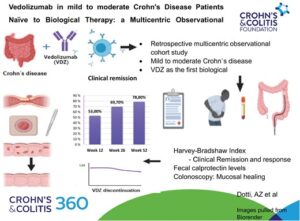Abstract
Background
In real-world experience, the number of patients using vedolizumab as first-line biological therapy was low. We aimed to evaluate the effectiveness and safety of vedolizumab in mild-to-moderate Crohn’s disease (CD) biologic-naïve patients.
Methods
We performed a retrospective multicentric cohort study with patients who had clinical activity scores (Harvey–Bradshaw Index [HBI]) measured at baseline and weeks 12, 26, 52, as well as at the last follow-up. Clinical response was defined as a reduction ≥3 in HBI, whereas clinical remission as HBI ≤4. Mucosal healing was defined as the complete absence of ulcers in control colonoscopies. Kaplan–Meier survival analysis was used to assess the persistence with vedolizumab.
Results
From a total of 66 patients, 53% (35/66) reached clinical remission at week 12. This percentage increased to 69.7% (46/66) at week 26, and 78.8% (52/66) at week 52. Mucosal healing was achieved in 62.3% (33/53) of patients. Vedolizumab was well tolerated, and most adverse events were minor. During vedolizumab treatment, 3/66 patients underwent surgery.
Conclusions
This study demonstrates the effectiveness and safety of vedolizumab as a first-line biological agent in patients with mild-to-moderate CD.

Keywords: Crohn disease, inflammatory bowel diseases, biological therapy
Issue Section: Observations and Research


